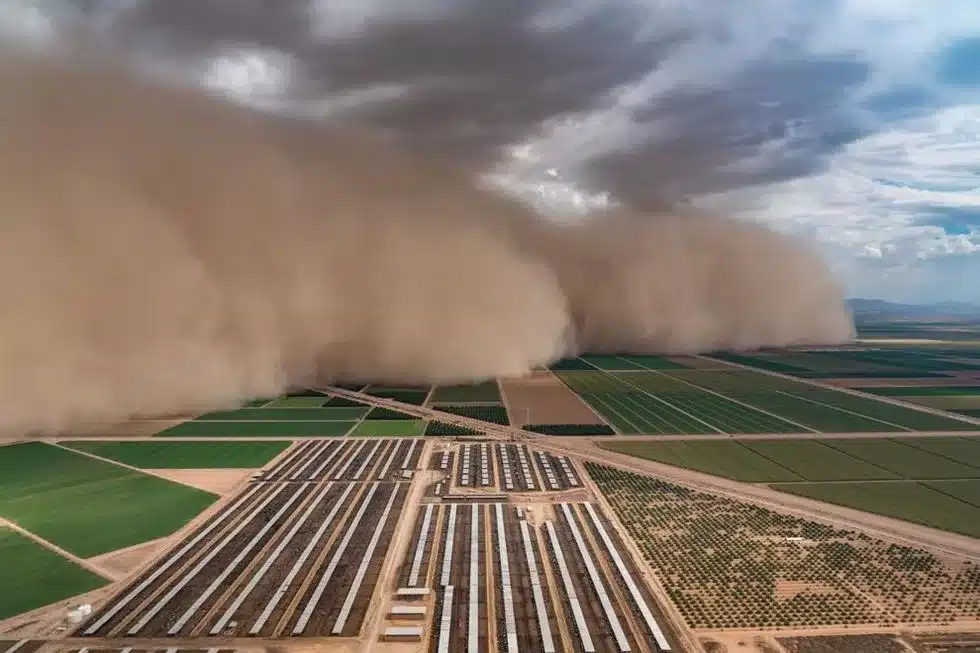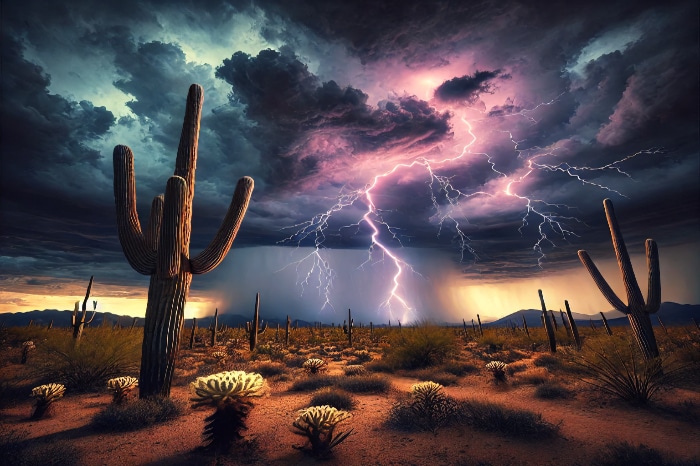How Rain Affects Internet Services in Arizona
and what you can do about it
Living in the Sonoran Desert of Arizona presents unique challenges, and one of them is the impact of rain on internet services. Two words that don’t always align: Desert and Rain. With an arid climate, rain events are somewhat of a rare occurrence in Central Arizona. It’s not until we get a measurable rain event that we realize how rain affects internet services in Arizona.
Rainy weather can affect Wi-Fi, particularly heavy rainstorms. Stormy weather, like our monsoonal storms, can weaken free Wi-Fi hotspots around Mesa/Gilbert/Chandler, and bad weather can also indirectly cause your home Wi-Fi network to go down.

Let’s explore how rain affects internet services in Arizona. In this arid region, with a specific focus on the two prominent Internet Service Providers (ISPs) in Arizona, Cox and CenturyLink. Understanding the potential issues and solutions can help Arizonans make informed decisions and ensure reliable internet connectivity, even during inclement weather.
-
Infrastructure Vulnerabilities: The Sonoran Desert experiences sporadic but intense rainstorms, which can pose challenges for the existing infrastructure of residential internet services. Both Cox and CenturyLink have extensive networks in the region, but their infrastructure may not always be designed to withstand heavy rain events in Arizona. Underground cables can be susceptible to water ingress, leading to signal degradation or complete service outages. Similarly, overhead cables can be damaged by strong winds accompanying rainstorms, resulting in similar issues.
-
Signal Interference: Rain can cause signal interference in wireless communication systems, affecting both Wi-Fi and cellular networks. Water droplets in the air act as obstacles for radio waves, leading to reduced signal strength and slower internet speeds. This interference is particularly noticeable in wireless networks, where the signal has to traverse through the rain-laden atmosphere to reach end-user devices. Both Cox and CenturyLink rely on wireless technologies to provide internet services, making them susceptible to signal degradation during rainstorms.
-
Power Outages: Rainstorms often bring lightning strikes and strong winds, which can result in power outages. Without a stable power supply, ISPs may struggle to maintain uninterrupted service. Power outages can disrupt the functioning of network equipment, including routers, modems, and switches, leading to temporary service disruptions until power is restored. Cox and CenturyLink have backup power systems in place to mitigate the impact of power outages, but prolonged outages can still affect service availability.
-
Mitigating the Impact: To minimize the impact of how rain affects internet services in Arizona, Cox and CenturyLink employ various strategies:a. Infrastructure Upgrades: Both ISPs continuously invest in infrastructure upgrades to enhance the resilience of their networks. This includes using waterproof cables, reinforcing overhead lines, and implementing robust grounding systems to protect against lightning strikes. These upgrades aim to minimize the vulnerability of the infrastructure to rain-related issues.b. Redundancy and Backup Systems: Cox and CenturyLink have redundancy and backup systems in place to ensure uninterrupted service during rainstorms. This involves deploying backup power generators, redundant network connections, and alternative routing options to bypass affected areas. These measures help maintain service availability even in the face of infrastructure failures caused by rain.c. Regular Maintenance: Both ISPs conduct regular maintenance of their network infrastructure to identify and address vulnerabilities proactively. This includes inspecting cables, checking for water ingress points, and conducting preventive maintenance on network equipment. By staying ahead of potential issues, Cox and CenturyLink can minimize the impact of precipitation and how rain affects internet services in Arizona.d. Customer Education: Cox and CenturyLink prioritize customer education to manage expectations during inclement weather. They provide information on service disruptions, estimated restoration times, and alternative connectivity options. By keeping customers informed, these ISPs aim to enhance customer satisfaction and reduce frustration during rain-related service disruptions.
Are you feeling the Impact of How Rain Affects Internet Services in Arizona?
First, you’re not alone. It’s common in Arizona, other states, and other countries. This is a global issue. Our friends down under in Australia are just as likely as us to experience this as we are.
What does ChatGPT have say about rain, and other weather events and their impact on your internet connections?
The following section was created by ChatGPT
Bad weather can have a significant impact on internet connection and WiFi signal strength. Heavy rain, snow, and high winds can all interfere with the signals that are used to transmit data over the internet. This can cause disruptions in service, slow speeds, and even complete outages. Additionally, lightning strikes can damage equipment and infrastructure, leading to further disruptions. Some ways to mitigate the effects of bad weather on internet connection and WiFi signal strength include:
- Placing your router in a central location, away from walls and other obstructions
- Using a router with a high-gain antenna to extend the range of your WiFi signal
- Investing in a good quality surge protector to protect your equipment from power surges caused by lightning strikes
- Keeping an eye on weather forecasts and being prepared for potential disruptions in service.
The Viable Short term solution (Regardless of what weather event is causing internet issues for you)
Working from home and experiencing poor internet service due to rain in the East Valley? Are you within driving distance of Ray and Higley Roads in Gilbert? Feeling Pain from the Rain, because you cant get any work done?
If you are, we have a lifeline for you. Our Day Passes are the perfect solution. You’ll get work done. You’ll make calls from our Private Call Booths. Drink some coffee, tea, or water. You’ll have plenty of parking on each side of our building. Sit at a desk or stand at one of our Standing Desks.
And best of all, our Internet is an Dedicated Optical Fiber Connection. Our Dedicated Internet feed is a private network connection that isn’t shared with nearby businesses or residents. Since our optical line isn’t accessible to those outside of The Works, we’re able to bypass Internet traffic. We’re guaranteed speeds with symmetrical upload and download speeds, which means you get equally fast upload and download speeds to support a variety of online tasks.
What’s next? Will this problem ever be solved?
Systems engineers with Internet Service Providers bear the responsibility of designing, implementing, and maintaining systems that can withstand the diverse challenges posed by nature, ultimately ensuring that residents in the Sonoran Desert have uninterrupted internet access, regardless of the weather conditions. Let’s hope progress is being made.
Should we expect rain any time soon?
 Gilbert, AZ
Gilbert, US
5:29 pm,
Sep 17, 2025
Gilbert, AZ
Gilbert, US
5:29 pm,
Sep 17, 2025
 99°F
broken clouds
99°F
broken clouds
-
Temperature
-
Precipitation
-
Rain Chance
-
Wind
-
Humidity
-
Pressure
8:00 pm
90°/96°°F
0 mm
0%
15 mph
29%
1007 mb
0 mm/h
11:00 pm
80°/86°°F
0.2 mm
20%
15 mph
47%
1010 mb
0 mm/h
2:00 am
77°/77°°F
1 mm
100%
5 mph
61%
1010 mb
0 mm/h
5:00 am
74°/74°°F
1 mm
100%
3 mph
58%
1010 mb
0 mm/h
8:00 am
82°/82°°F
0 mm
0%
2 mph
53%
1011 mb
0 mm/h
11:00 am
89°/89°°F
0 mm
0%
2 mph
42%
1010 mb
0 mm/h
2:00 pm
94°/94°°F
0 mm
0%
5 mph
33%
1007 mb
0 mm/h
5:00 pm
95°/95°°F
0 mm
0%
7 mph
29%
1006 mb
0 mm/h

- Temperature
- Precipitation
- Rain Chance
- Wind
- Humidity
- Pressure




